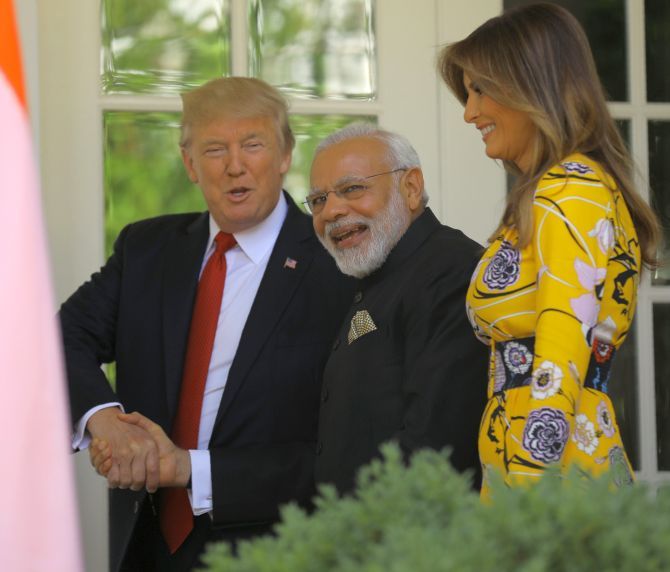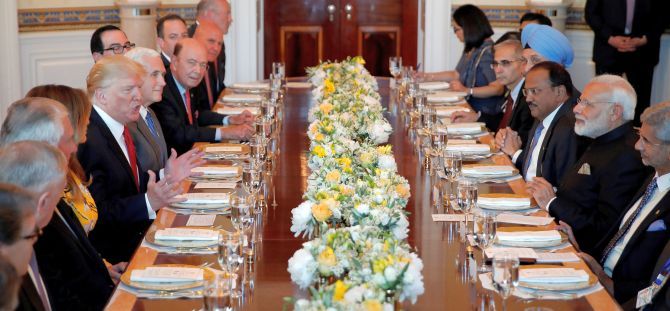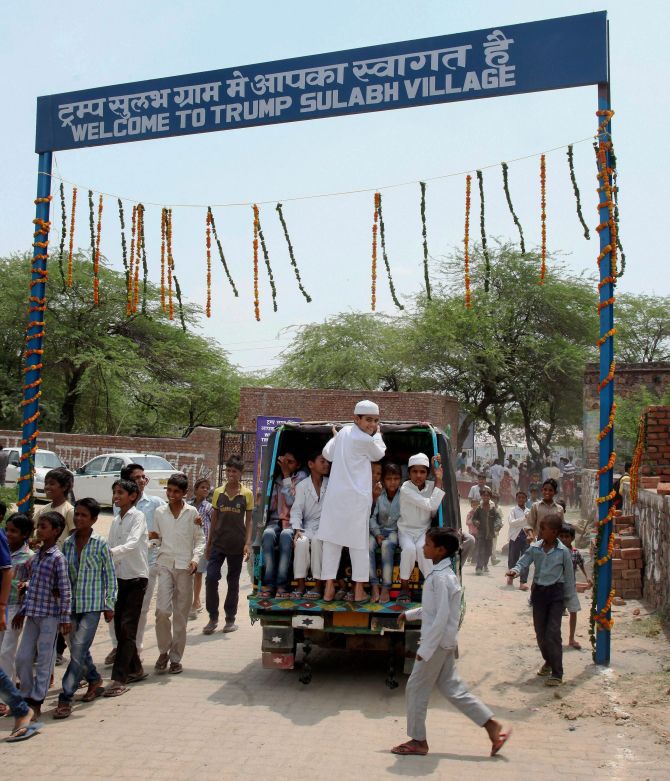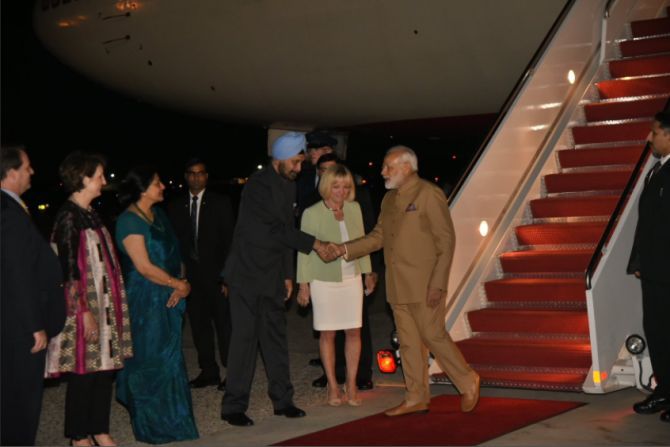'This is the first time that the Americans have agreed to refer to "cross-border terrorist attacks" in a joint statement.'
'No wonder Pakistan has called the joint statement "singularly unhelpful" and has blasted it, and its all-weather friend China has applauded Pakistan's frontline role in combating terrorism,' points out former foreign secretary Ambassador Kanwal Sibal.

Despite the unpredictability of Donald Trump, his domestic embroilments, different power centres causing disarray in his administration, the effacement of the State Department in foreign policy making, Prime Minister Modi's visit to Washington has ended not only with no unwelcome surprises, but, overall, with positive results.
The US, even under the mercurial Trump, has, objectively speaking, nothing to gain by assigning a low priority to India.
But the short horizon transactional nature of Trump's approach even towards allies created doubts whether towards India, Trump will think in a longer term perspective and not concentrate on immediate advantage and quick gains that could be presented to his political base as fulfilment of his promise to Make America Great Again and bring jobs back home.
Trade
Four high ranking US Congressional leaders -- both Republicans and Democrats -- had in fact written to Trump to press Modi to remove barriers such as high tariffs, inadequate IPR protection, and inconsistent licensing and regulatory practices.
These long-standing American complaints against India are prone to resonate with Trump more strongly given his highly contestable belief that the US has been a victim of unfair trade and investment practices by the rest of the world.
In the event, differences with India on its trade, investment and IPR policies and the need to reduce the trade deficit by more opening for US goods in the Indian market were treated publicly in a low key manner during the visit.
But this pressure point on India will continue as Trump underlined at the joint press conference with Modi the need to create a trading relationship that is fair and reciprocal and to remove barriers to the export of US goods to the Indian market in order to reduce the trade deficit.
There is no reference in the joint statement to the H1-B visa issue, the concerns of the Indian IT sector or the target of $500 billion in bilateral trade set during the Obama presidency.
Modi met leaders of the US IT giants prior to his official talks and no doubt sought to mobilise their support for shared interests in this sector.

The US side gave a red carpet welcome to Modi, as promised.
Trump decided to set aside a lot of his time to engage the Indian prime minister, which is good as this gave an opportunity to build some personal chemistry, which, with a person as self-absorbed and publicity conscious as Trump, coupled with his disregard for institutions, could be more productive than it might be otherwise.
That Melania Trump received him on his arrival to the White House was an exceptional gesture intended to show personal regard for the guest.
Actually, Modi's visit followed closely the script laid out by a senior White House official in his advance briefing.
As a signal of the importance attached to the visit, the US, disregarding equivalence on the Indian side, fielded an exceptionally high-level delegation for the talks, comprising of Vice- President Mike Pence, Secretary of State Rex Tillerson, Defence Secretary James Mattis, Commerce Secretary Wilbur Ross, and Treasury Secretary Steve Mnuchin, apart from National Security Advisor Lieutenant General H R McMaster.
All key decision makers on relations with India across the spectrum were present, which should prove useful as it exposes them directly to discussions on all the issues on the India-US agenda at the highest political level.
China
With Trump having radically changed his discourse on China, it was unclear how much of the geopolitical understandings reached with the US earlier on the challenges posed by China's rise and the impact of the expansion of its naval power on the Indo-Pacific region would be endorsed by the Trump administration.
The Trump-Modi joint statement omits any reference to the India-US Joint Strategic Vision for the Asia-Pacific and Indian Ocean Regions, which loosens the strategic embrace of the two countries in dealing with the rising China threat.
However, in a watered down version of earlier thinking, the two leaders agreed that a close partnership between the US and India as 'responsible stewards in the Indo-Pacific region' is central to peace and stability in the region.
Without mentioning the South China Sea directly, the issues arising from China's assertive conduct there are reflected in the joint statement which reiterates the 'importance of respecting freedom of navigation, overflight, and commerce throughout the (Indo-Pacific) region' and calling 'upon all nations to resolve territorial and maritime disputes peacefully and in accordance with international law'.
Unlike in the Modi-Obama joint statement of June 2016, the UNCLOS is not mentioned, which is helpful to China.
A welcome surprise this time is that the US has endorsed the formulation we have used to convey our opposition to China's Belt and Road Initiative, with Trump and Modi affirming support for 'bolstering regional economic connectivity through the transparent development of infrastructure and the use of responsible debt financing practices, while ensuring respect for sovereignty and territorial integrity, the rule of law, and the environment'.
Our opposition to the BRI is principally on account of violation of our sovereignty over PoK.
For the US then to endorse a reference to sovereignty is diplomatically piquant.
We should keep in mind though that despite Japanese Prime Minister Shinzo Abe securing formulations in his joint statement with Trump on issues in the western Pacific, Trump veered off on a different tack with China subsequently in pursuit of other interests with that country.
Terrorism
On the subject of terrorism, the designation, just before Modi's arrival, of the Hizbul chief Syed Salahuddin as a Specially Designated Global Terrorist by the US has significant nuances.
Unlike the designation of the LeT, JeM, the JuD and its chief Muhammed Saeed, as terrorist outfits or individuals by the US and the UN, the HuM is supposedly a Kashmiri organisation operating from PoK with cadres in J&K, and not a Pakistani jihad organisation.
This designation politically delegitimises the so-called indigenous Kashmiri resistance. This blow to Pakistan, important though it is, will not alter its conduct as it has continued to support with impunity all the organisations and individuals designated as international terrorists.
Pakistan has already declared it unacceptable that the peaceful indigenous Kashmiri struggle has been equated with terrorism and individuals supporting the right of self-determination have been designated as terrorists.

Pakistan
On Pakistan itself, the formulations in the joint statement are more exacting this time, calling on it 'to ensure that its territory is not used to launch terrorist attacks on other countries' and asking it 'to expeditiously bring to justice the perpetrators of the 26/11 Mumbai, Pathankot, and other cross-border terrorist attacks perpetrated by Pakistan-based groups.
This is the first time that the Americans have agreed to refer to 'cross-border terrorist attacks' in a joint statement.
No wonder Pakistan has called the joint statement 'singularly unhelpful' and has blasted it, and its all-weather friend China has come out with a statement applauding Pakistan's frontline role in combating terrorism.
Defence
Though the joint statement speaks of India and the US working 'together on advanced defence equipment and technology at a level commensurate with that of the closest allies and partners of the United States', it omits any reference to the Defence Trade and Technology Initiative, which was supposed to be the vehicle for realising this objective and give substance to the designation of India as a Major Defence Partner.
While the Obama administration seemed reluctant to approve the sale of Sea Guardian Unmanned Aerial Systems to India, Trump has cleared it.
The joint statement expresses the determination to expand India-US engagements on shared maritime objectives and explore new exercise beyond the Malabar exercise, with Trump specifically mentioning Japan as a partner in this exercise, which by endorsing trilateral cooperation in the Indo-Pacific conveys a political signal to China too.
On other issues, while the advance briefing mentioned that the US views India's role in Afghanistan as 'very positive', the formulation on Afghanistan in the joint statement is perfunctory and gives little clue of US policy direction.
No mention is made of the Taliban, an Afghan-led reconciliation process, the sharp deterioration of the situation in the country and so on.
Energy
The advance briefing mentioned that energy partnership would be an important part of the trip and that Indian energy companies have signed over $32 billion in long-term contracts for the export of US-produced liquefied natural gas.
On energy-related issues, the absence of any reference to climate change and the Paris Agreement was to be expected.
In his press statement Trump announced US intention to export American energy to India, including long-term contracts to supply American natural gas under negotiation for which he wants a higher price.
Surprisingly, the joint statement refers to Modi and Trump looking forward to finalising contractual agreements between Westinghouse and NPCIL for six nuclear reactors when Toshiba, the Japanese company that owns Westinghouse, has filed for bankruptcy.

To Sarna's left is MaryKay Loss Carlson, charge d'affaires at the US embassy in New Delhi.
Photograph: MEA/Twitter
Modi played his cards well in Washington.
It was judicious to invite Ivanka Trump to lead the US delegation to the Global Entrepreneurship Summit in India this autumn, for which the President expressed his satisfaction.
He did not hold any big rally this time in Washington in order not to upstage Trump in any way.
Unusually, no customary meeting was held with Congressional leaders this time to continue consolidating the bipartisan support India enjoys in the US Congress.
Clearly, the idea was to make engagement with Trump the focal point of the visit.
Trump too played his role well, emphasising that he was a true friend of India in the White House.
The issue of India's restrictions on NGOs and religious organisations on which numerous Congressmen are agitated was not publicly aired.
Managing relations with the US remains a difficult task and we will need all our acumen to make the best of the opportunities ahead and wade the inevitable shoals that will come our way with least harm.
Kanwal Sibal is a former foreign secretary. He has served as deputy chief of mission in Washington, DC and as India's ambassador to China, France, Egypt and Turkey.










